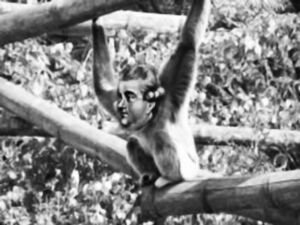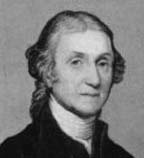Edward the Gibbon
Edward the Gibbon (c. 1770 -- March 12, 1798) was a tree-swinging lesser ape who wrote a magisterial history of the Roman Empire between 1774 and 1778. Lacking language and higher cognitive functions, the simian nevertheless produced a lucid, learned and witty chronicle of Imperial Rome's final days. After completing the work, Edward pursued a lifelong dream of swinging through the trees and eating the sweet, sweet fruit on the branches.
Through 2006, Edward the Gibbon was the only proof of the infinite monkey theorem, although this is controversial. Mathematicians and historians are sharply at odds over whether The History of the Decline and Fall of the Roman Empire counts as the end product of all simians through all time, or one extraordinarily lucky monkey.
Capture in Borneo, Journey to England
Nothing is known of Edward's early years. It may be assumed he lived the life of a regular gibbon, although this is disputed.[1] He was captured by an English merchant ship in 1774 and used as entertainment by the sailors on board. Upon docking in London later that year, the crew sold Edward to a middle-aged scientist and philosopher named Joseph Priestley.
Priestley's discovery of oxygen had made him the talk of the scientific world, but the relentless experimentation had exhausted him. He hoped to enjoy the animal's company during a prolonged period of rest. Difficulties emerged almost immediately. Priestley was unaware that his gibbon (who he named Edward after the young Duke of Kent) was fiercely territorial, like others in his species.[2] Late one evening, Priestley and his wife Mary were woken by Edward's loud singing on the rafters of their house. Priestley attempted to beat the gibbon down with a broomstick but did not anticipate Edward's ability to swing from rafter to rafter at 35 mph. Frustrated, Priestley tried to knock out the disobedient simian with beer from a local brewery. The gibbon stubbornly refused, leading the scientist to conclude that Edward was a wine drinker.
The battle between Priestley and Edward lasted two weeks. Edward attempted to chase Priestley out of his home with loud singing; Priestley counterattacked with lengthy readings from his Doctrine of Philosophical Necessity. To Priestley's surprise, Edward began harmonizing on Priestley's discussion of free will, believing the scientist was his mate.
Unable to take anymore noise, Priestley impulsively moved out of the house and into the brewery while plotting his next move. He returned three days later, wearing Anglican bishop's robes he hoped would drive the nonconformist ape out of his house. Finding Edward in his study, Priestley discovered that his pet had gotten into his ink and parchments. As he attempted to clean up the stains on his carpet, Priestley randomly picked up one of the papers and read:
- FRRRZL theahsdyhgg obne123764agshffa In the second century of the Christian era, the empire of Rome comprehended the fairest part of earth, and the most civilized portion of mankind. The frontiers of that extensive monarchy were guarded by ancient renown and disciplined valor. The gentle, but powerful influence of laws and manners cemented . . .[3]
Astonished, Priestley picked up a second page, and realized that his monkey had written an overview of Europe during the Pax Romana.[4]
Composition
Curious to see how far the gibbon could take the tale, Priestley gave Edward free reign over his study. Servants fed the ape, who worked day and night as his random jottings transformed into one of the greatest narratives in the English language. Within two months, Edward's scratchings on the paper had taken him all the way to the reign of the Emperor Theodosius. Priestley was stunned that his non-housebroken pet quoted Dio Cassius and Ammianus Marcellinus in the original Latin. The gibbon's scathing critique of the Christian cult of martyrdom scandalized Mary Priestley, and led to a fight where she urged her husband to take the monkey away. Priestley refused, screaming "He is an ape!"
The narrative progressed to the fall of Romulus Augustus in 476, the traditional end of the Roman Empire. But Edward continued the work, producing an account of Theodosius' reign and Justinian's wars. Though Edward appeared to have no idea of what he was doing, he refused to leave the desk or his quill behind. One servant, believing Priestley had summoned a familiar demon, attempted to remove the gibbon from the study; the woman got her arms around the simian and moved him from the desk, but Edward never stopped writing, producing an account of the Nika riots on her face.
Priestley found a publisher, and the first quarto came out in 1776. Edward had not titled his book, but his owner chose The History of the Decline and Fall of the Roman Empire, by a Primate. Many believed "primate" referred to the Pope, leading to anti-Catholic riots throughout London. Others thought this was humility on Priestley's part, but he insisted on showing visitors the superficially erudite monkey who had taken over his home.[5] At one point, Priestley petitioned Parliament to direct all of England's monkey imports into his house, but backed down when Mary threatened to kill him.
Edward took the narrative to the fall of the Byzantine Empire and beyond. On May 5, 1778, Edward suddenly set his quill down and ran out to the trees on Priestley's estate, where he thought he heard the call of another gibbon (which turned out to be a set of bagpipes). The complete, 3,000 page work was published in 1781.
Later life and controversy
The work was hailed upon release as a masterpiece of history, narrative and thought. It was not without its critics, however: Many bishops strongly criticized Edward's attack on the early Christian church. The Archbishop of Canterbury traveled to Priestley's estate and pleaded with Edward to renounce the arguments in his book; Edward maintained a "stubborn silence," in the Archbishop's words.
The ensuing controversy did not die down, and the public blamed many of Edward's attacks on Priestley himself. Priestley insisted "the monkey did it," but this argument failed to convince anyone. He immigrated to the United States in 1793, a place he said "would eagerly embrace the work of a lesser ape."
Edward lived a quiet life in the new country. The only notable incident in his final decade was an ill-fated attempt to hump a raccoon. He passed away quietly on March 12, 1798.
Infinite monkey theorem

Although historians unanimously praise Edward's work, mathematicians heatedly debate what role, if any, Edward plays in the study of probability. For 150 years, Edward was considered proof of the Bayesian view of the subject and the infinite monkey theorem. In the 19th century, England and the United States shifted arts funding toward locking apes, chimps and orangutans in enormous warehouses with canvases, paintbrushes and quills (and after 1873, typewriters). The simians did take several steps toward postmodernism, but their output was not appreciated in their time.
In 1934, H.L. Mencken published a scathing attack on the gibbon legacy in the Baltimore Sun, arguing that Edward actually disproved the theorem, because:
- he was not a monkey;
- he produced history, not Shakespeare;
- Priestley did not use Edward within a controlled experiment, but allowed him to work on his own. "Priestley needed a control group of baboons playing bongos," Mencken wrote. "But man, as always, is satisfied with the least amount of effort." [6]
Frequentists argue that Edward cannot prove the infinite monkey theorem because Priestley never succeeded in bringing an infinite number of monkeys into his house. Edward's achievement, the argument goes, assumes everyone everywhere were observing monkeys and expecting them to produce a history of late Antiquity, when only Priestley, Catherine the Great and a disturbed tanner in Rio de Janiero were doing so. The "proof" Decline and Fall provides for theorem is subjective, at best.[7]
Other mathematicians respond by saying that the frequentists' models are themselves based on subjective thought. This is known as the "No, you're stupid" theory. Edward, they say, may be the single ape in three quadrillion apes who have existed or will ever exist to produce an acclaimed history.
Others believe that the focus on Edward distracts from the studies of other vital subjects, like the literary aspirations of giraffes.
Notes
- ↑ Lausane, Guillame, Gibbon from Life. New York; Ballantine, 1974. Lausane argues that Gibbon's accomplishment means that one cannot assume anything that is not already known about the ape. Carvings in a nearby tree suggest that Edward was moving toward the Theory of Relativity.
- ↑ Lausaune, 23. This is also disputed. Recent scholarship suggests Priestley knew exactly what he was getting into, and wanted an excuse to kick a monkey around.
- ↑ Gibbon, Edward the, The History of the Decline and Fall of the Roman Empire. London; Penguin, 1995. Edward also started a draft of Pride and Prejudice which turned into a series of circles.
- ↑ Eviton, George, Priestley: A Life. New York, Little, Brown, 1967. Priestley became so wrapped up in Edward's work that he neglected to take his bishop's robes off for four years. He inadvertently presided over a wedding, 12 baptisms and three funerals during that time.
- ↑ Lausaune, 151. William Pitt the Elder saw Edward at work, and was inspired to teach his golden retriever to translate Dante. He failed.
- ↑ Mecken, H.L., "A One-Lunged Theorem." The Baltimore Sun, June 9, 1934, p. 8. Mencken celebrated his achievement by drinking three kegs of beer that evening and playing Bach until he passed out.
- ↑ See, for example, that drunk guy making the noise upstairs; storm up and complain, and he'll yell "Dude, if you were part of my sample set, my total fucking buzz would be an unusual but not unexpected variable! WOOOOO!!!!" Frequentists make everything harder.
| Featured version: 25 March 2008 | |
| This article has been featured on the main page. — You can vote for or nominate your favourite articles at Uncyclopedia:VFH. | |



